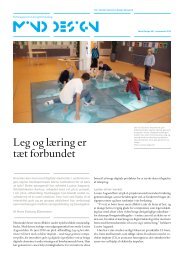Play-Persona: Modeling Player Behaviour in Computer Games
Play-Persona: Modeling Player Behaviour in Computer Games
Play-Persona: Modeling Player Behaviour in Computer Games
Create successful ePaper yourself
Turn your PDF publications into a flip-book with our unique Google optimized e-Paper software.
2. A THEORETICAL FRAMEWORK FOR MODELING PLAYERS<br />
Before unfold<strong>in</strong>g play-personas <strong>in</strong> detail, it is necessary to chart the environment from which the<br />
tool has emerged. This l<strong>in</strong>e of research <strong>in</strong> fact does not only stem from game studies, but has its<br />
feet firmly planted both <strong>in</strong> Human-<strong>Computer</strong> Interaction and <strong>in</strong> communication studies.<br />
The study of games from an academic perspective is a fairly recent phenomenon. Be<strong>in</strong>g computer<br />
games very complex artifacts, perhaps the richest cultural genre yet seen, they lend themselves to<br />
a number of approaches and perspectives. Game studies as a discipl<strong>in</strong>e is not only multi-<br />
discipl<strong>in</strong>ary, showcas<strong>in</strong>g a variety of <strong>in</strong>dependent fields of research scrut<strong>in</strong>iz<strong>in</strong>g the phenomenon<br />
separately, but also <strong>in</strong>ter-discipl<strong>in</strong>ary s<strong>in</strong>ce there have been several cases of research projects that<br />
successfully crossed boundaries between established academic fields [43, 55]. Yet, because of this<br />
multifaceted nature, the necessity for an <strong>in</strong>dependent discipl<strong>in</strong>e focus<strong>in</strong>g on games is still debated<br />
[67]. Independently from the position taken on the subject by different scholars there is one factor<br />
that cannot be ignored whatever angle is used to approach the issue: human players. <strong>Games</strong> are<br />
both objects and processes and as such they must be played. In Aarseth’s words:<br />
“<strong>Play</strong><strong>in</strong>g is <strong>in</strong>tegral, not co<strong>in</strong>cidental like the appreciative reader or listener. The creative<br />
<strong>in</strong>volvement is a necessary <strong>in</strong>gredient <strong>in</strong> the uses of games. The complex nature of simulations is<br />
such that a result can’t be predicted beforehand; it can vary greatly depend<strong>in</strong>g on the player’s luck,<br />
skill and creativity. In multi-player games, social skills are needed, or must be developed.” [2]<br />
2.1 Game studies: contribut<strong>in</strong>g discipl<strong>in</strong>es<br />
The role of the human player cannot be ignored if we want to understand how games as processes<br />
can take place. It has been argued [19] that the diversity of perspectives adopted to <strong>in</strong>vestigate the<br />
cultural phenomenon of games could be a result of the <strong>in</strong>dispensability of the human player as an<br />
actuator of games as processes. <strong>Games</strong> are <strong>in</strong> fact studied by sociologists, psychologists,<br />
anthropologists and economists attempt<strong>in</strong>g to assess the effects of play<strong>in</strong>g games on people [92,<br />
20, 21, 59, 60, 45].<br />
Cognitive science looks at computer games as fields to experiment and test theories on human<br />
consciousness s<strong>in</strong>ce games represent rich, multi-modal, controllable environments for conduct<strong>in</strong>g<br />
cognitive experiments [65].<br />
23















